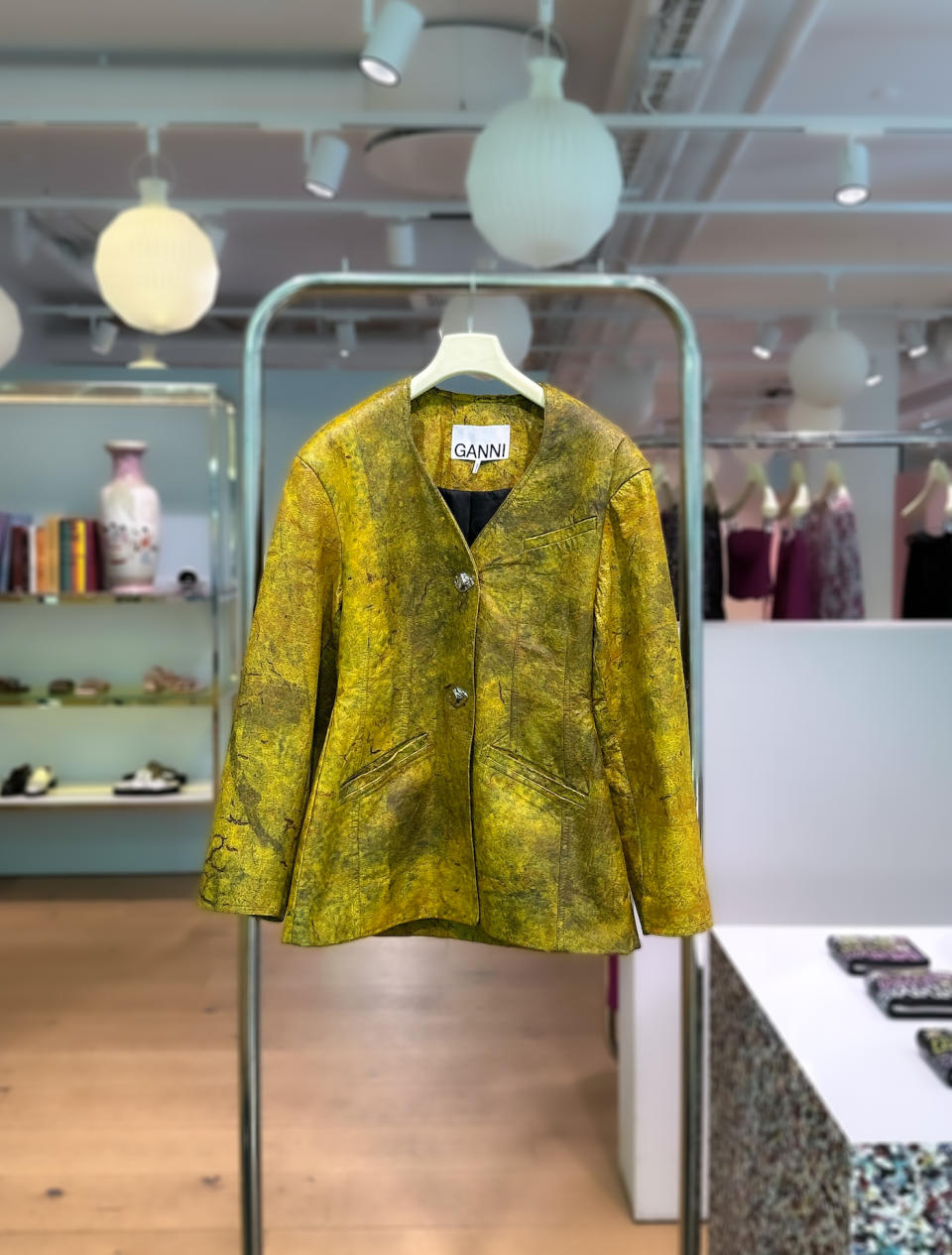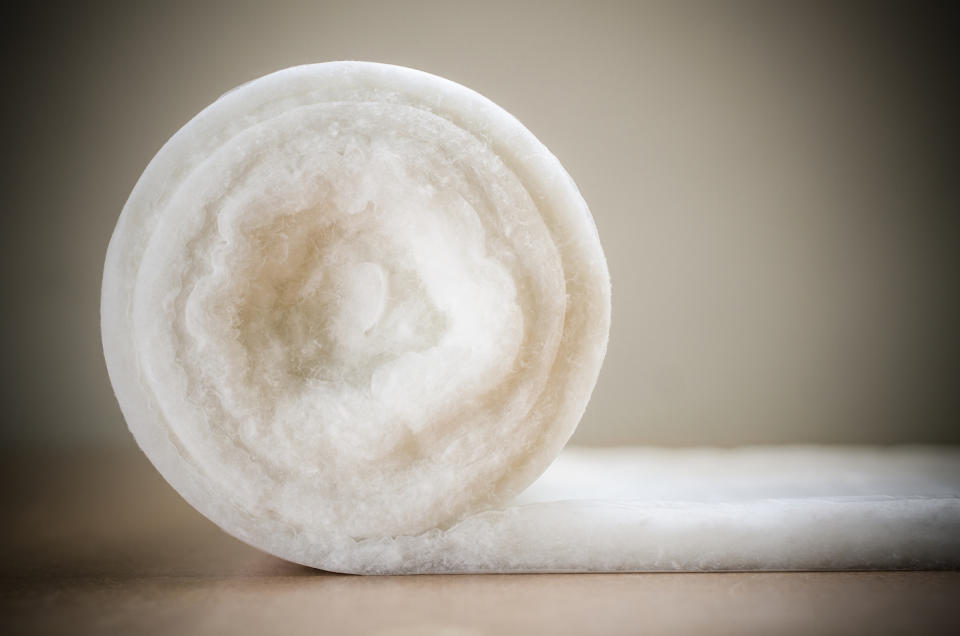Material World: Bringing Bacteria Blazers to Market

Material World is a weekly roundup of innovations and ideas within the materials sector, covering news from emerging biomaterials and alternative leathers to sustainable substitutes and future-proof fibers.
Ganni x Polybion
More from Sourcing Journal

Danish brand Ganni and materials company Polybion unveiled their bacteria-grown jacket at the Global Fashion Summit in Copenhagen last month.
“To captivate consumers, a product must transcend mere adequacy and strive for greatness,” said Alexis Gómez-Ortigoza, Polybion’s co-founder and CFO. “This pursuit drives our strategic partnerships with globally renowned companies like Ganni, enabling us to gain invaluable insights into how our materials integrate into their supply chains and culminate in final product applications or potential collections.”
Made with Polybion‘s Celium bacterial cellulose leather alternative, the prototype blazer marked the first time a global brand has utilized this type of biomaterial to create a viable garment. To create Celium, the 2023 Fashion for Good Innovation Program innovator feeds bacteria with agro-industrial fruit waste, such as mangos, converting the sugar contents into a cellulose structure as a metabolic by-product. Once that structure is formed, Celium’s cell-based membrane “undergoes a sustainable stabilization process,” the company said, to achieve high-performance attributes such as strength and breathability. Similar to tanning cowhide, the membrane is treated to mimic a leather-like texture.
“The expertise and perspectives of industry leaders such as Ganni are vital pillars within our iterative process, empowering us to refine our materials, elevate product standards and contribute to a better world. Transforming biomaterials into a widely accessible choice for large-scale consumer applications is an immense undertaking. It requires collaborative efforts among global brands, startups, and suppliers to bring groundbreaking innovations like Celium to fruition,” Gómez-Ortigoza said. “Working alongside Ganni, recognized as one of the Times 100 most influential companies of the year, has been an incredibly inspiring experience. Our shared vision of sustainability and our affinity for companies that challenge the status quo through bold actions make this collaboration a statement to Ganni’s commitment to the circular economy.”
The two companies are working at “full speed” to bring consumer-ready Celium garments to market next year, Gómez-Ortigoza said.
Polybion COO Diogo Frada said collaborating with Ganni is “just a first step.”
“[W]e know that we are on the right path,” Frada said, pointing to “opportunities to improve processes and material.” “This is not a sprint race; this is more like an ultra-marathon, and we are and will be ready for all next challenges.”
Conagen
Conagen has developed what it believes is a “groundbreaking” debondable textile adhesive—ie, tape seams—made from high-performance, sustainable materials sourced from natural biomolecules.
The biotechnology company said it created the new material make it easier for manufacturers that have to rework fabric quickly and without affecting the textile’s performance.
According to Conagen, the new debondable adhesive can help producers cut costs by minimizing the material waste that results when revamping a style and ripping into less-performing seaming substances. The company claims its development empowers manufacturers to quickly and easily fix production errors without throwing out the materials altogether. Users can tweak products by debonding the glue and adjusting the style as needed.
“Conagen’s pioneering adhesive has unlocked new possibilities and opportunities. This groundbreaking development enables efficient material separation during reworking and recycling processes and preserves the integrity of textile fibers, ensuring their quality for future utilization,” Sara Johnson, senior materials scientist, said. “With the introduction of Conagen’s adhesive, we are taking a significant stride towards achieving a more sustainable and environmentally responsible textile industry.”
Self-healing materials inspire Conagen’s tape seam. It is made with sustainable and natural ingredients to achieve high-strength debondable hot melt adhesives that can be used with both synthetic and natural fibers and materials. And the company does so via its precision fermentation technology that uses sustainable, bio-based ingredients.
“Conagen’s fermentation technology is forging a path towards a more sustainable future where the utilization of sustainable biocompounds and biomaterials takes center stage in propelling high-performance solutions that prioritize environmental consciousness,” J. McNamara, vice president of chemical applications, said. “By harnessing the power of fermentation, Conagen is leading the charge in promoting greener alternatives and revolutionizing industries with its commitment to sustainability and innovation.”
Chargeurs PCC

Apparel interlings manufacturer Chargeurs PCC debuted a collection of sustainable waddings for padding at the 37th edition of the Italian trade fair Milano Unica. The autumn/winter 2024-35 collection of waddings is made from a combination of Nativa wool and polylactic acid (PLA), a biodegradable corn byproduct.
The company also presented Italian-made Thindown+Nativa, a combination of the sustainable wool and Natural Insulation Product (NPI) ’s patented technology that offers the natural biodegradable advantages of down in a single fabric. Thindown is made of virgin down left over from the food industry and is RDS-certified or recycled down meeting GRS certification criteria.
“At Chargeurs, we believe in partnerships only with the best sustainable brands in the textile industry,” said Gianluca Tanzi, Chargeurs’ CEO and chairman. “Thindown is a revolutionary innovation that we are proud to add to our outstanding product range.”
Chargeurs also showcased its anti-migration solutions using bio-elastic interlining to prevent down from moving and shifting around into clumps that create uneven pockets of insulation. The elastane “down bag” improves the finished product’s performance and comfort.

